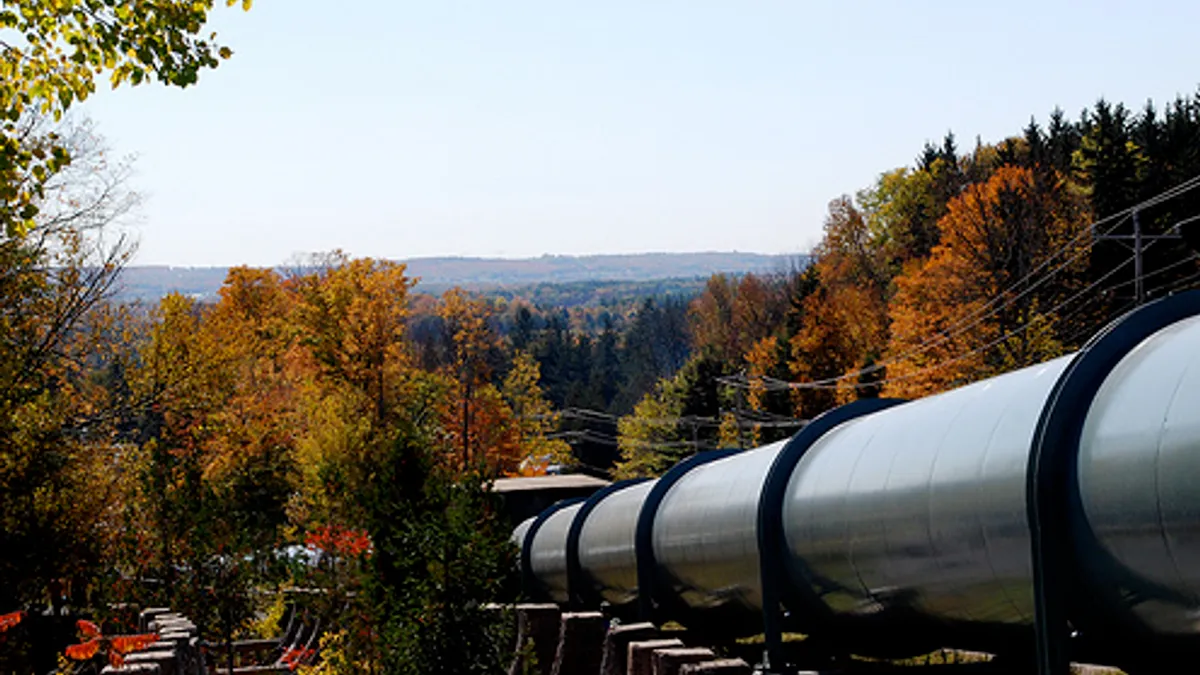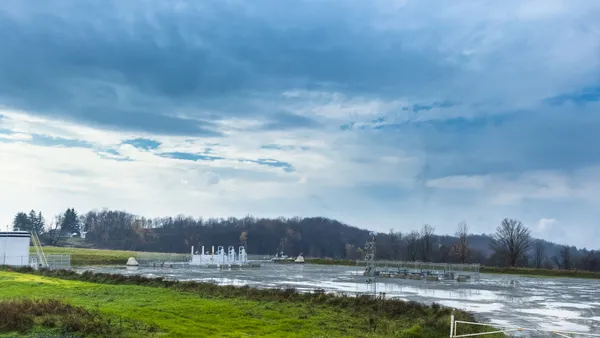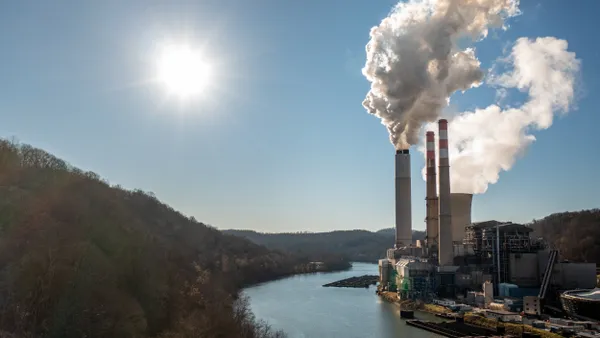Dive Brief:
- The Federal Energy Regulatory Commission on Friday approved the Atlantic Coast and Mountain Valley pipeline projects in two 2-1 votes, as well as two smaller associated pipeline proposals.
- In their approval, FERC Chairman Neil Chatterjee and Commissioner Robert Powelson rejected a broader, "programmatic" evaluation of pipeline necessity, writing that FERC acts specifically on individual applications. Commissioner Cheryl LaFleur dissented, noting the similar routes, timing and demand centers served by the projects.
- The decisions follow a federal court ruling in August directing FERC to take climate impacts into account when it evaluates pipeline proposals. Chatterjee last week said the ruling would not change FERC's consideration process for pipelines, and the Friday decisions held that the climate impacts from the two pending pipelines "cannot be determined."
Dive Insight:
The Atlantic Coast and Mountain Valley pipeline projects are among the most controversial in the nation, with environmentalists and landowners along the proposed routes arguing the projects will infringe on property rights, destroy pristine ecosystems and lock in fossil fuel use for decades.
FERC's approval of the projects was appropriately muted — filed quietly after the work day on Friday.
In approving certificates of public convenience and necessity, Chatterjee and Powelson wrote that benefits of the projects will outweigh "any adverse effects on existing shippers, other pipelines and their captive customers, and landowners or surrounding communities."
The agency rejected calls for more public comment on the proposals, writing "all interested parties have been afforded a full complete opportunity to present their views to the commission."
The regulators also rejected calls for a broader review of the necessity and impacts of multiple pipeline proposals, writing that the "commission is not engaged in regional planning."
"[T]he Commission processes individual pipeline applications in carrying out its statutory responsibilities under the NGA," regulators wrote. "That there currently are a number of planned, proposed, or approved infrastructure projects to increase infrastructure capacity to transport natural gas from the Marcellus and Utica Shale does not establish that the Commission is engaged in regional development or planning."
Commissioner Cheryl LaFleur disagreed, writing in her dissent that "alternative approaches," like combining the two projects into one, larger, pipeline, "could provide significant environmental advantages."
During evaluation, FERC asked both pipeline builders to propose combined pipelines that could avoid national forests and other sensitive habitat. Though those alternatives were rejected, LaFleur wrote that they "demonstrate that the regional needs that these pipelines address may be met through alternative approaches that have significantly fewer environmental impacts."
FERC should expand its evaluation of pipeline necessity to include "evidence of the specific end use of the delivered gas" from a proposed pipeline, rather than relying on precedent agreements from the utilities pledging that the pipelines will be fully prescribed.
That expanded evaluation would be a change for FERC, which has more than 40 pipeline proposals set for consideration in the coming months. According to a report from the Center for Public Integrity published in July. ERC has only rejected two pipelines in the past 30 years.
Outside of LaFleur, however, the commission does not appear keen to alter its pipeline evaluation process.
In August, the D.C. Circuit Court rejected FERC's approval of the Sabal Trail pipeline in Florida, ruling that regulators failed to assess climate impacts and alternate routes.
FERC held that the climate impacts of the project were unknowable, and last week, Chatterjee told reporters that he does not believe the ruling will "significantly alter the way that we evaluate these projects."
The Atlantic Coast and Mountain Valley decisions reflect that sentiment, saying that because the "project’s incremental physical impacts on the environment caused by climate change cannot be determined," FERC can also not determine "whether the projects’ contribution to cumulative impacts on climate change would be significant."
The Atlantic Coast and Mountain Valley pipelines must still complete state permitting processes to begin construction. Last month, North Carolina Gov. Roy Cooper threw that process into question, delaying a decision on a critical water quality permit for Atlantic Coast until mid-December.
Environmentalists hailed the decision as a sign the pipeline could yet be blocked, but FERC has already shown it is willing to intervene when possible to overrule state decisions. Last month, the commission overruled a New York decision to deny a water permit to the Millennium Pipeline, saying the state had waited too long to act.














